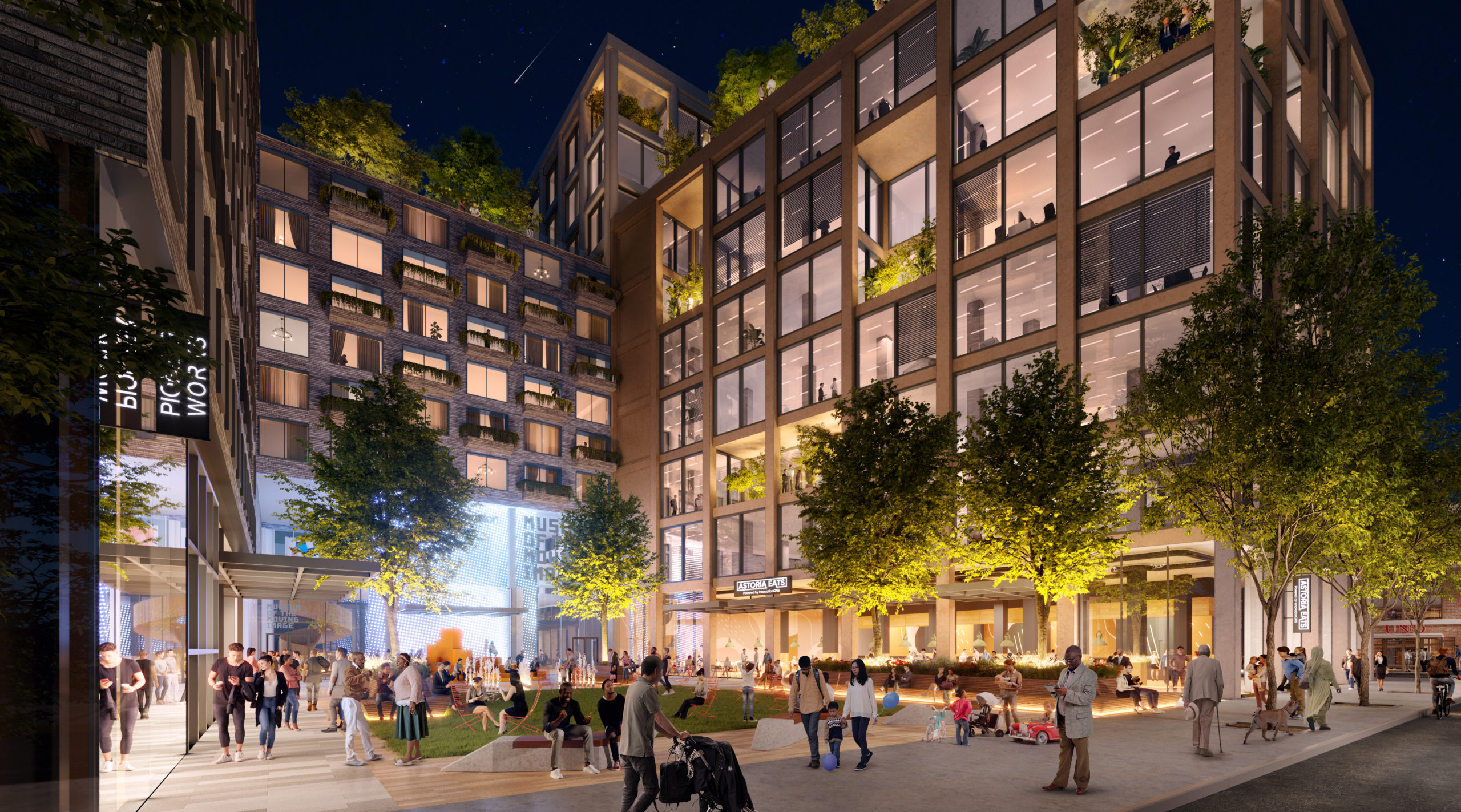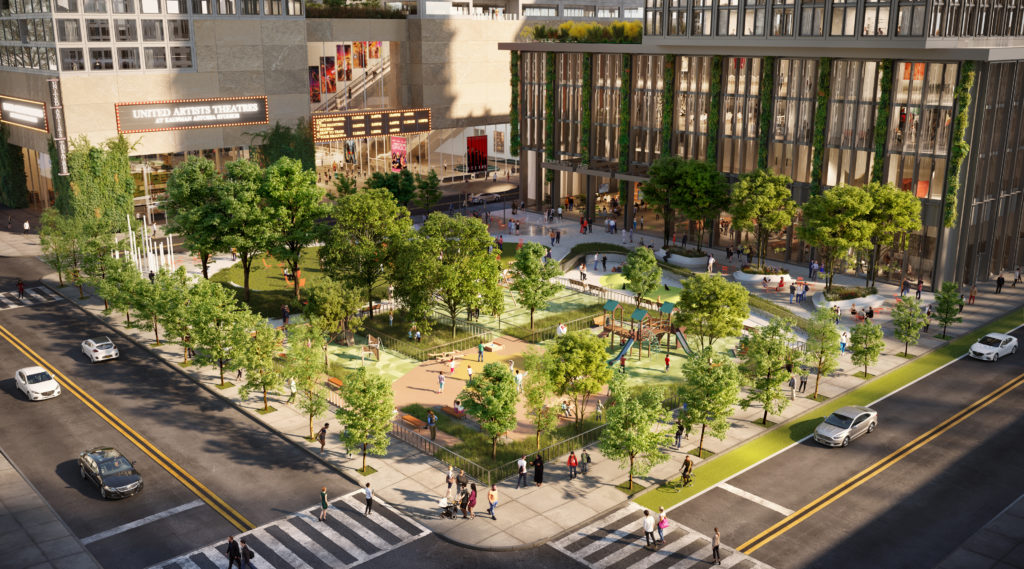Commissioners voted 10-3 in favor of controversial project
By Jessica Meditz

Rendering of 38th Street Plaza by Innovation QNS.
The City Planning Commission gave a thumbs up to the large Innovation QNS project proposed for Astoria, despite a big thumbs down from Community Board 1 in June.
The proposed $2 billion development would build 12 towers between Northern Boulevard and 37th Street, some up to 27 stories tall, along with two acres of open space and 2,800 housing units — 700 of them permanently affordable — or 25 percent.
The commissioners voted 10-3 in favor of the proposal, advancing it to the next step of the city’s Uniform Land Use Review Procedure (ULURP) application process.
Kaufman Astoria Studios, Silverstein Properties and BedRock Real Estate Partners are the developers behind the project.
Tracy Capune, vice president at Kaufman Astoria Studios, sees the CPC’s nod to the project as a significant stepping stone to providing benefits to the community.
“The need for affordable homes, family-sustaining jobs, public open space and expanded services for immigrants, seniors and young people has never been greater, and [the] overwhelming approval of Innovation QNS by the City Planning Commission is an important step toward delivering all of that and more for our neighbors in Astoria,” she said.
“We look forward to working with Councilmember Won and our neighbors in the weeks ahead to ensure City Council approval of this $2 billion investment at a critical moment for our community.”
Moments before the CPC voted, Chairman Dan Garodnick recommended the commission vote to approve Innovation QNS, citing thousands of job opportunities, affordable housing, public open space and many amenities.
“The affordable housing component of this project that will be created without public subsidy would be considered the largest privately financed affordable housing project in Queens in generations. At a time when our housing crisis is more pronounced than ever, that is a big deal and a big opportunity to take the pressure off the rents in this and surrounding communities,” Garodnick said.
“Innovation QNS is a unique opportunity to create nearly 3,000 homes including hundreds of permanently affordable homes that will change the lives of thousands of New Yorkers, providing them with stability in a vibrant neighborhood — where little of that stability currently exists,” he continued. “We should not let such an opportunity pass us by.”
Now, it’s up to the City Council to vote on whether or not to approve Innovation QNS; however, Councilwoman Julie Won, who represents Astoria in District 26, has been vocal about her disapproval of the development project since the beginning of her time in office.
Usually, the City Council votes in accordance with the position of the councilmember who represents that district.
Won criticized the developers of Innovation QNS for “disregarding” the voices of locals and not considering the community’s need for deeply affordable housing.
“I have requested for the development team to return to the community again with modifications and we will not settle for a plan that is below 50 percent affordable. Nearly 70 percent of renters in this part of Astoria are already rent-burdened or severely rent-burdened, with a current average rent of around $1,800. There are 54,000 eviction cases filed in NYC this year alone. I cannot in good conscience add more market-rate luxury housing in my district where it continues to produce an upward trend in rising rents,” she said.
“I refuse to inflict greater displacement and increase risk for evictions for working class families in my district. The developers are still offering only the minimum of 25 percent affordable apartments, calling on the city to utilize public dollars to provide any additional affordability,” Won continued. “My apprehension for this project remains and I have serious concerns that this project will displace many immigrant and working class residents that call this part of Astoria home, as landowners worry about their profit margins.”
Last month, Queens Borough President Donovan Richards also said “no” to the project; however, his input merely served as a recommendation.
In his recommendation, Richards called for an increase in the number of affordable housing units as well as expanding the lowest affordable income band to individuals or families earning 30 percent area median income (AMI).

Rendering via Innovation QNS.
“New York City is in the throes of a housing crisis, with Astoria families feeling that crush harder than most, but we have an incredible opportunity before us to reverse this tragic trend. I stand by my recommendation that certain commitments be made by the Innovation QNS development team to meet this moment,” he said.
“I have a deep respect for the City Planning Commission and its work, and I am hopeful [this] vote will lead to a healthy dialogue and community-first solutions as Innovation QNS proceeds to the City Council,” Richards added. “I remain in close contact with the developers, my fellow elected officials and all our community stakeholders, and will continue to push for true community-first solutions on the issues of affordability and equity.”
An ongoing critique of Innovation QNS is that the developers failed to engage in adequate, robust community outreach before moving forward with the application process.
Even CPC Chair Garodnick acknowledged in his opening remarks that the development team could have done a better job with this, and encouraged all future applicants to keep comprehensive community engagement at the “forefront of their minds.”
Evie Hantzopoulos, an Astoria resident, a member of CB1’s Land Use Committee and an activist with Astoria Not For Sale strongly believes that the Innovation QNS team has not done enough to improve their community outreach.
At a town hall meeting held at Kaufman Astoria Studios back in April, Hantzopoulos referred to their community engagement efforts as “a joke,” and told them outwardly that they are not being transparent.
“They’ve spent their time trying to get people to sign postcards to send in favor of it. That’s not outreach. They’re not trying to understand what the community wants and needs,” she said. “They already have their plan. They’re going through with it. Anything they do is perfunctory.”
As for her reaction to the CPC approving the plan: “disappointed, but not surprised.”
“We are going to mobilize and make sure that the voices of people who are going to be most affected are being heard,” she added.
Farihah Akhtar, an Astoria resident and organizer at CAAAV: Organizing Asian Communities, described Garodnick’s praise to the community members who came out to raise their voices against the project as “hollow and a slap in the face” to those fighting gentrification and displacement.
“Billionaire developers are enabled by our broken city planning and land use process and this has festered for decades. New York City is facing a major housing crisis, but what we need are deeply affordable units…these units are out of reach for working class and immigrant communities that have traditionally called Astoria home,” she said.
“NYCHA residents, with median incomes of approximately $20,000 per year, would not even meet the income requirements to apply for the affordable housing lottery,” Akhtar added.
“We will continue fighting. Astoria and New York City deserve real affordable housing and meaningful community engagement. This project is wrong and no amount of rationalization makes it palatable to our communities.”



